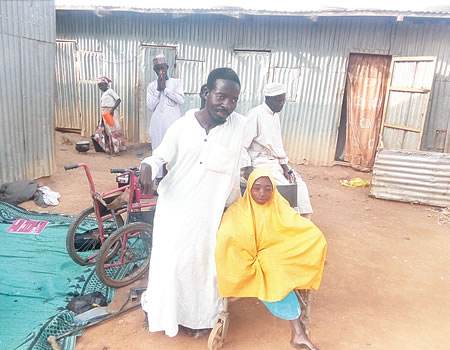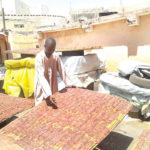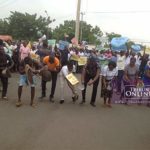THEY came from all over the country, especially from the Northern states about three decades ago to settle in Kaduna. They found shelter in the popular Kano Road central mosque in Kaduna. Most of them at that time slept in a makeshift tent on the mosque premises with their wives and childrent. All of them are physically challenged.
According to one of them who pleaded for anonymity: “At that time, we didn’t have a shelter. Whenever we went out to beg for alms, we would return to the mosque. The mosque served as our shelter.”
Sunday Tribune learnt that the choice of the mosque was not by accident, as it was the first recognised central mosque in Kaduna where the late Premier of the Northern region, Sir Ahmadu Bello, the Sardauna of Sokoto, in company with other top government functionaries usually observed the weekly Friday Jumaat prayer.
Many of them also slept in the mosque because they found it more secure since government officials usually came there to observe their prayers.
However, an incident that was to change their destiny happened, when the then governor of the state, Senator Ahmed Makarfi, completed the renovation of the mosque sometimes in 1999. The management of the mosque sent the squatters packing.
The Emir of Zaria, Alhaji Shehu Idris, who was around when the quit order was given queried the order. He reportedly advised the mosque management against making such move and urged them to find a place for the beggars before asking them to leave.
Recalling, the experience with nostalgic feelings, the Sarki (leader) of the physically challenged persons, Abdullahi Ismail, disclosed that through the efforts of the late District Head of Doka, (Bunu Zazzau), the District Head of Gabasawa, (Dankajen Zazzau), the late Imam of the Kano Road mosque, and the late Sheikh Zubairu Surajo an alternative accommodation was found for them.
“If not for the Emir of Zazzau, we wouldn’t have been here. We relocated to this place with all our wives and children. We are not paying any rent,” he declared.
The home for the physically challenged, located on Kano Road has about 40 rooms, mostly constructed with roofing sheets. It was learnt that since the home was handed over to the its new occupants, no individual or group has added any structure to the existing one until the coming of a former senator who represented Kaduna Central, General Sani Saleh. It was he who decided to build additional 16 rooms to ease the congestion there.
“From a population of 100 occupants when we first packed into the house in 1999, today we are about 1,000 inhabitants living in this compound. You will find five or seven people living in a room,” Ismail explained.
Interestingly too, apart from being the leader of the beggars, he also doubles as their king. Ismail told Sunday Tribune that he was installed in 2000 and since then he has been living with all his subjects in the house with his four wives and 18 children.
According to one of the residents, they had no problem with the leadership style of Ismail, saying his subjects love him. “We love our king because he runs an honest and transparent administration. He is just and fair to all. He settles all kinds of disputes among us. Even between husband and wife.
Commenting on the way he runs the house, the king noted that being a leader especially leading people with disabilities is not an easy task. However, he said he is happy with the support he gets from his council members.
According to him, from time to time, the council meets to discuss the welfare of the people, disclosing that they chose to run the affairs of their people using the emirate system. The cabinet, he stated, “reflects the emirate system where there are Galadima, Chiroma, Turaki, Waziri etc. who help in running the council.”
Apart from that, it was also gathered that sometimes the local as well as the state governments do consult him on urgent matters concerning them. However, for all his good services to his people, he disclosed to Sunday Tribune that he does not receive any compensation, urging the government of Kaduna State to review the status of his office.
“It is high time government reviewed its stand on my status and start giving me something. That’s how I will be more respected by my subjects. But if someone comes here and gives us money and I share equally with my subjects, how do you expect them to respect me?” he queried.
But it is not all a rosy situation for the beggars, Sunday Tribune’s findings revealed that the beggars are confronted with various challenges. one of which is electricity, a situation they have been facing for decades. The community does not have electricity at all.
Suleiman, a 17-year-old son of one of the beggars living with his parents, lamented that there is no electricity there.
“I grew up here”, he said “But I have not seen electricity all these years. Life here is boring, extremely difficult and displeasing. We have phones, but we have to trek somewhere to have them charged. If we want cold water, we have to trek to get it. We need so many things here.”
Ismail, their leader, confirmed that indeed it has been years since the community enjoyed electricity. He, however, is not blaming anyone but themselves for their present situation.
“We used to have light but a fire incident that ravaged a section of the house 10 years ago made us to be afraid of using electricity and we, therefore, requested that we should be disconnected. Since then for the past decade, that’s how we have been managing our lives here without light,” he explained.
Apart from electricity, it was learnt that the construction of more toilets would alleviate the problem faced by the women and children who usually go to a nearby bush to defecate.
“Individuals as well as corporate organisations should come in and build more toilets for us because government alone cannot do all these things.
“A church came the other day to construct a borehole in the compound. We need such things. As you can see, we don’t have problem of water again,” he said.
Speaking further, he lamented that most of their kids are out of school because they lack the means to support their education. “Many of us have children, but we cannot afford to send them to school.
“Most of us beg to feed our families. Yes, we don’t have jobs because the society doesn’t care. Many see us as liabilities, but we are not. We have this burning desire to be independent,” he explained.
Ismail would not want his children to share his fate and be conditioned to a life of begging. “We cannot be beggars and want a similar fate for our children too. My son wrote WASC but, I don’t have the money to train him to further in his studies.
“Even though, I am consoled with one thing, as none of my 18 children are begging, if I am no more, they could resort to begging. That’s my fear. So, our children need to be educated and liberated from poverty,” he stated, imploring the government to consider establishing a school so that their children can have the sense of belonging.
According to him, not all of them want to continue the life of begging if they are given financial support.
“I am appealing to the government, whether state or federal, to assist us with soft loan to enable us to set up small scale enterprises. If they do that, I am assuring you that many of us will leave begging,” he added.
Indeed, there are among the residents some who are very creative and knowledgeable in some craft. 29-year-old blind man, Ibrahim Ahmed, who specialises in making flower vases and pots is one of such persons. But Ahmed claimed he could have done more if he had the means to procure the right tools for his work.
“With the right working tools”, he declared “I can produce three flower vases in two days.” But the lack of capital to buy the necessary tools, he explained, is slowing him down.
“With N50,000 I can buy the necessary things to enable me to start in a big way,” he said.
Society looks down on us…
These special people are also made to suffer societal degradation. Many people look down on them and treat them as sub-human. Hassan Aliyu a physically challenged 33-year-old man narrated his story to Sunday Tribune, especially on the treatment he got from people.
According to him, he got married to his wife, Suwaiba, also physically challenged, five years ago. Today the couple has a three-year-old daughter. Their wish is to see their daughter grow up and attend school like any normal person, but unfortunately, according to him, they are being treated like second class citizens. He lamented that people are even afraid to relate with them.
“The see us as if we are animals, not human beings. I pray people will see us as being part of them. They should understand that we did not make ourselves this way. That’s how Allah wants to see us,” he declared.
What is the state government doing anything to help to help these special people out of their problems?
Kaduna State Chairman of the Lepers Association, Hassan Lawal, while thanking God for His blessings, said the government had been supporting them well by giving them free drugs regularly. he commended the government for the efforts.
The state commissioner for Women Affairs and Social Development, Hajiya Hafsat Baba, said government was trying to improve the lives of the physically disadvantaged persons in the state. According to her, the state has a good policy for the physically challenged persons, saying once the bill for the physically challenged persons is signed into law, it will address most of the issues affecting them.
Unfortunately living within a community but not having access to basic things, not to talk of being accepted as part of that community could be traumatic. These beggars are looking up to government to solve their problems but it is difficult to say if that is possible in a clime such as this.







